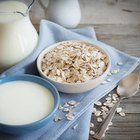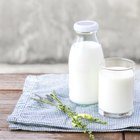Can Babies Drink Silk Soy Milk?
While babies under a year old should not drink soy milk, Silk soy milk, in the context of a healthy diet that also includes calcium-rich foods, is a suitable beverage for toddlers after they've been weened off breast milk or formula. Health authorities, including Harvard School of Public Health physicians, recommend giving young children Silk and other soy products only in moderation, however. Consuming Silk also might cause allergic reactions in some children.
Soy Milk and Babies
Babies under 1 year of age have very specific nutritional needs that cannot be met with soy milk. According to the University of Michigan Health System, infants should consume only breast milk or formula during their first 12 months of life in order to get all of the fatty acids, amino acids, vitamins, minerals and other nutrients they need to thrive. Breast milk provides superior nutrition to formula, however, and breast milk alone is the ideal food choice for your baby's first six months, notes U of M. After six months, your baby can be weaned off breast milk to an iron-fortified infant formula, although ideally babies should breastfeed for a full 12 months, according to U of M.
Soy Milk and Toddlers

Hemp Milk vs. Oat Milk for Toddlers
Learn More
Once your baby is 1 to 2 years old, you can start safely introducing certain foods, including Silk soy milk, into her diet. According to WhatToExpect.com, most experts recommend cow's milk as the primary beverage choice for toddlers after they're weened off breast milk or formula, but a cup or two per day of soy milk might benefit your toddler. It is good for toddlers to get some of their protein from vegetable sources such as soybeans. Silk soy milk also is fortified with iron, a very important nutrient for young toddlers, and it comes in different flavors that a picky eater might prefer over the taste of milk. However, it's important to watch out for any allergic reactions your toddler might have to soy and make sure your toddler also drinks cow's milk or eats other calcium-rich foods.
Silk Soy Milk vs. Cow's Milk
Silk soy milk offers certain advantages over cow's milk when it comes to your toddler's nutrition. For one, Silk contains less unhealthy saturated fat, cholesterol and sugar. A cup of whole milk contains 8 g of fat, including 4.6 g of saturated fat, 24 mg of cholesterol and 13 g of sugar. A cup of Silk unsweetened soy milk contains 4 g of fat, only 0.5 g of which is saturated, 0 mg of cholesterol and 1 g of sugar. Silk also provides certain nutrients that cow's milk does not, including iron and fiber, but cow's milk offers important nutrients that Silk doesn't: While both beverages provide similar amounts of calcium, soy products contain natural compounds called phytates that can reduce calcium absorption, according to WhatToExpect.com. Cow's milk also provides about 1 g/cup more protein than Silk.
Health Concerns

Should a Toddler Drink Sweet Acidophilus Milk?
Learn More
Certain compounds in soy milk called phytoestrogens might produce estrogen-like effects in the body. According to the Harvard School of Public Health's Walter C. Willett, M.D., Ph.D., there's some evidence that soy/phytoestrogen consumption during childhood might increase risk of breast cancer later in life. However, the evidence is not conclusive, and cow's milk also often contains hormones, including estrogens, whose long-term effects also are not well-known, notes Willett. While moderation is a good policy when it comes to soy milk and your child, one to two glasses per day is likely safe, according to Willett. An allergic reaction to soy is an immediate health concern, however. Seek immediate medical care if your child displays allergic symptoms after drinking soy milk. These can include hives and itching in the mouth, flushed skin, trouble breathing, abdominal pain, and/or swelling in the face and tongue.
Related Articles
- University of Michigan Health System; Feeding Your Baby and Toddler (Birth to Age Two); Kyla Boyse, R.N.; September 2010
- KidsHealth.org; Feeding Your 1- to 2-Year Old; Steven Dowshen, M.D.; August 2008
- "Harvard Health Letter"; By the Way, Doctor: Children and Soy Milk; Walter C. Willett, M.D., Ph.D.; May 2009
- WhatToExpect.com: The Scoop on Soy Milk for Children









